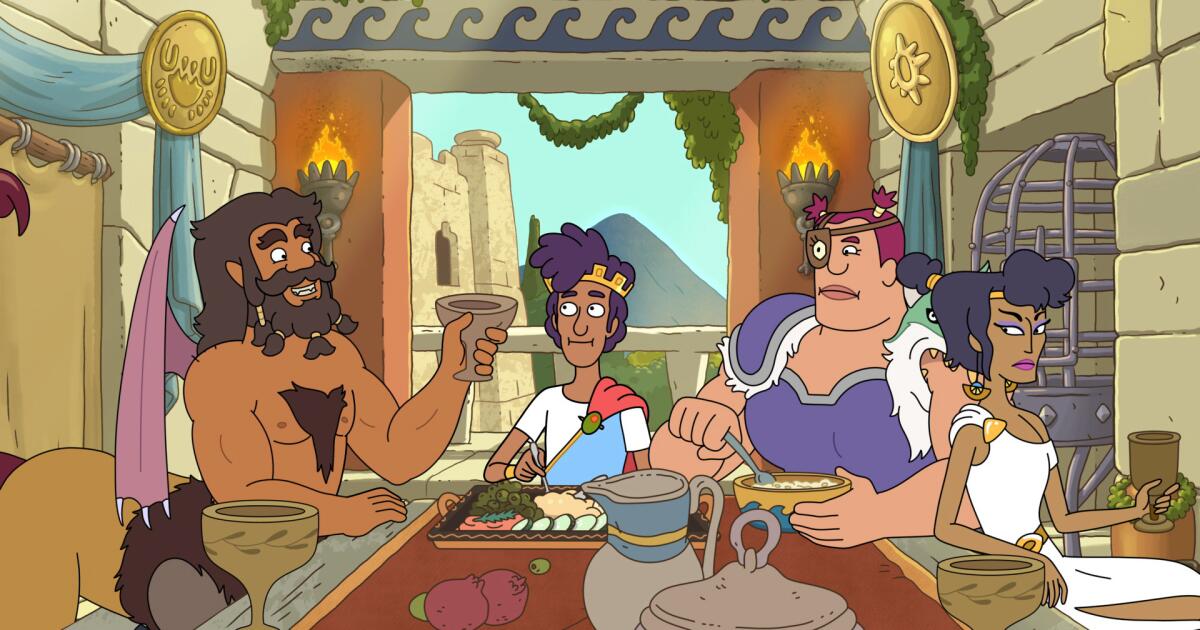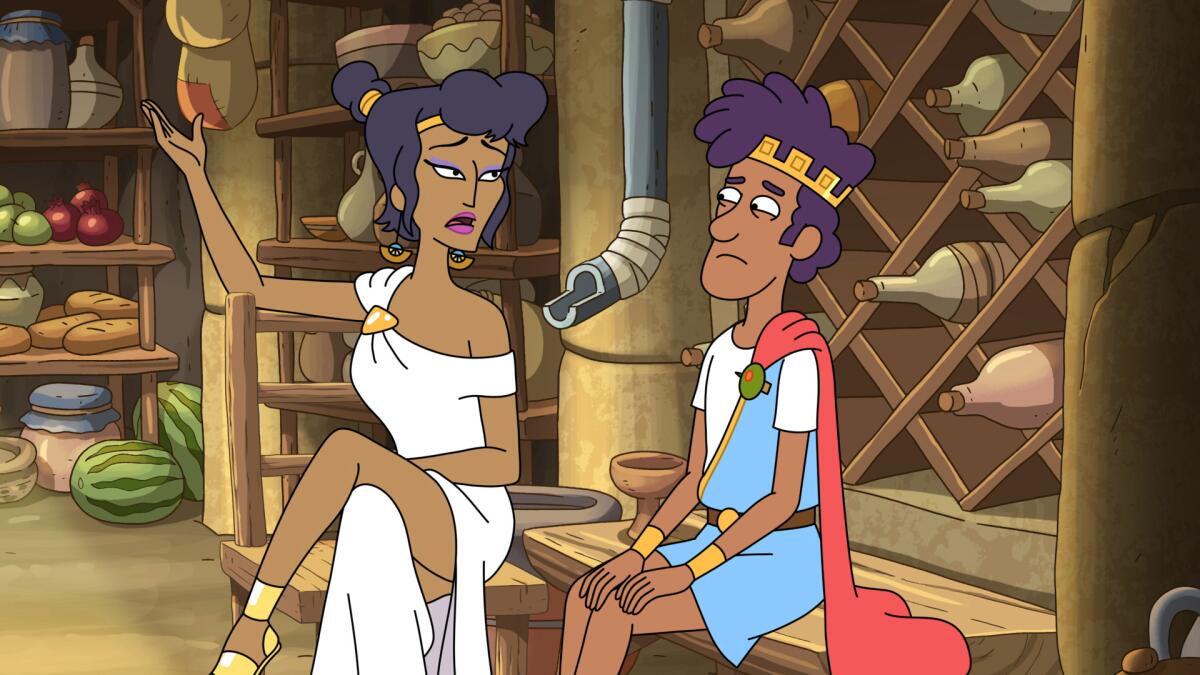
According to what I’m seeing on the internet, men of the 21st century think a lot about the Roman Empire. I suppose, in that I’ve been receiving a flood of unsolicited pictures of the Colosseum and such in social media feeds, I could be counted accidentally among them, though when it comes to ancient world I am more Team Greece than Team Rome, more Acropolis than Forum. The Greek gods, intellectual property the Romans plagiarized whole, had cooler names; their graphics had nicer lines; they came up with things like democracy and philosophy and were more interested in science and literature than orgies and blood sports. They’re the Lennon vs. McCartney, the Beatles vs. the Stones of their overlapping time, though I couldn’t exactly say which was which.
Given the opportunities for sex and sensationalism, the Roman Empire in its rise, decline and fall has had a healthy life on the screen, going back to the silent era on the big screen, and including BBC’s “I, Claudius,” a PBS favorite over here, HBO’s “Rome” and Starz’s multiple “Spartacus” series on the small. Greece, not so much, and almost always in a mythological rather than historical setting.
So it is something of a surprise to find “Krapopolis,” a cartoon set in ancient Greece, created by Dan Harmon, of “Community” and “Rick and Morty” renown (with Jordan Young, from “BoJack Horseman,” as showrunner), moving into Fox’s Sunday night animation block. What’s more, it has already been renewed — twice — before its premiere, suggesting that Fox considers the show to be marketable, and that they have seen more episodes than the three sent out for review; I liked them well enough, and more as they went on, but I wouldn’t necessarily consider “Krapopolis” a three-year safe bet.
Shlub (Matt Berry) and Hippocampus (Duncan Trussell) in “Krapopolis.”
(Fox Media)
It has been cast for success. Immediately recognizable to followers of British comedy, and establishing a beachhead of goodwill, are the voices of Richard Ayoade, whom many will know from “The IT Crowd,” as King Tyrannis, the mortal son of a goddess and a monster, who dreams of civilization, and Matt Berry, currently of “What We Do in the Shadows,” as his father, Shlub — half centaur, half manticore, which is to say, part man, part horse, part eagle, part lion, part scorpion and all sex machine. These are men who make the most innocuous line sound funny.
Hannah Waddingham, from “Ted Lasso,” plays Tyrannis’ mother, the noncanonical, self-admiring goddess Deliria, who has suffered a social reverse among the Olympians and has moved in with the family. Duncan Trussell (Pen Ward’s collaborator on the exquisite “The Midnight Gospel”) is his half-brother Hippocampus, son of Shlub and a mermaid, who’s a kind of fish in a water-filled globe atop a spindly body supported by an armature; he’s into science. (“I didn’t become a scientist to make normal people smarter,” he tells Tyrannis, who has asked him to create a written language. “I did it to make them terrified of my godlike power.”) Pam Murphy rounds out the main cast as big, musclebound half-sister Stupendous, the product of Deliria and a Cyclops, representing the warrior element.
Backing them is a long murderers’ row of recurring and guest voices, notably Keith David, having a good time as barbarian king Asskill (getting his teeth into lines like “You would not believe the line at the kebab stand”) and Michael Urie as a bitchy Hermes. Also here are Zach Woods, Annie Murphy, Jane Lynch, Steve Buscemi, David Cross, Yvette Nicole Brown, Zosia Mamet, Susan Sarandon, Daveed Diggs, Ben Stiller, Will Forte, Dave Franco and Joel McHale, from Harmon’s “Community,” along with cartoon superstars Tom Kenny and Tara Strong.
Harmon’s is a potted, mish-mashed history, obviously, but it is historical, having something to do with the rise of city-states, which he believes “are going to be huge,” and set somewhere between Homeric and classical Greece. A dweeb, but not exactly a dope, Tyrannis is something of a visionary, looking forward from a savage past to a world run by “diplomats, negotiators, deal makers.” “They’re citizens, not slaves,” he says of the Krapopolitans, whom Deliria wants to build her a temple. “We’re doing more of a modern thing that doesn’t really include temples.” At the same time, the comedy makes the citizens disposable for the sake of a joke, and Deliria does routinely turn citizens into slaves.

Deliria (Hannah Waddingham), left, is Tyrannis’ mother, who routinely turns citizens into slaves.
(Fox Media)
(Hippocampus has a more measured view of his brother’s ambitions: “He tells powerless people they’re powerful and they like that so they give him all their power.” I can’t think of any modern analogue to that.)
Fundamentally, like its network neighbors “The Simpsons” and “Bob’s Burgers,” it’s a dysfunctional family sitcom, with Tyrannis as the “normal” character in a family of queer customers, the Marilyn in “Munsters” terms. As in all such comedies, dissension ultimately leads to support. Deliria, who by way of announcing her arrival, declares, “Prepare to disappoint the goddess Deliria,” will help Tyrannis more than hinder him, if only as a byproduct of her dominant self-interest. Shlub is a caring father, even when he believes Hippocampus to be a murderer: “Son, as monsters we have to be careful about our messaging; bad monsters kill people, good monsters have sex with people. Trust me, that’s where the action is.”
Is it funny? I found it amusing, interesting, generally clever. Making vernacular idiots out of epic figures or translating contemporary matters into other eras (“Flintstones,” anyone? “Jetsons”?) is always good for a laugh. And an Episode 3 storyline involving Stupendous and a pack of wolves won me over. Its best feature is perhaps its unlikeliness: It has the oddness of a passion project, inexplicable in commercial terms — three-season deal notwithstanding — but something its makers just wanted to see. That’s not a bad place to start.












